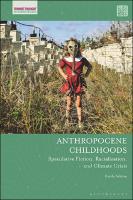Anthropocene Childhoods
Speculative Fiction, Racialization, and Climate Crisis
Author(s)
Ashton, Emily
Collection
Knowledge Unlatched (KU)Language
EnglishAbstract
This open access book brings together the disciplines of childhood studies, literary studies, and the environmental humanities to focus on the figure of the child as it appears in popular culture and theory. Drawing on theoretical works by Clare Colebrook, Elizabeth Povinelli, Kathryn Yusoff, Donna Haraway and Bruno Latour the book offers creative readings of sci-fi novels, short stories and films including Frankenstein, Handmaid’s Tale, The Girl with All the Gifts, Beasts of the Southern Wild, and The Broken Earth trilogy. Emily Ashton raises important questions about the theorization of child development, the ontology of children, racialization and parenting and care, and how those intersect with questions of colonialism, climate, and indigeneity. The book contributes to the growing scholarship within childhood studies that is reconceptualizing the child within the Anthropocene era and argues for child-climate futures that renounce white supremacy and support Black and Indigenous futurities. The eBook editions of this book are available open access under a CC BY-NC-ND 4.0 licence on bloomsburycollection.com. Open access was funded by Knowledge Unlatched.
Keywords
childhood studies; literary studies; environmental humanities; science fiction; sci-fi; child development; ontology; racialization; parenting; colonialism; climate; indigeneity; Anthropocene era; child-climate futures; climate crisis; decolonizationISBN
9781350262409, 9781350262393, 9781350262409Publisher
Bloomsbury AcademicPublisher website
https://www.bloomsbury.com/academic/Publication date and place
London, 2022Grantor
Imprint
Bloomsbury AcademicSeries
Feminist Thought in Childhood Research,Classification
Philosophy and theory of education
Educational strategies and policy


 Download
Download